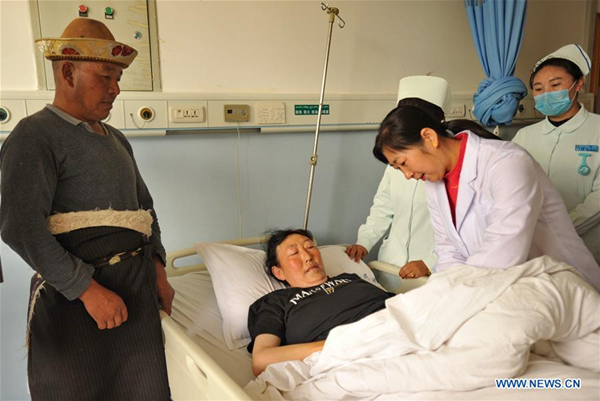 May 28, 2019 -- Nearly 300 healthcare workers and volunteers from Beijing set off on Sunday morning to deliver medical assistance to areas in the cities of Lhasa, Shigatse and Nyingchi in the Tibet autonomous region. The mobile medical teams will visit local hospitals, grassroots clinics, temples and social welfare institutes to provide a range of services, including diagnosis and treatment of various diseases, and to help train local medical workers, according to Jin Dapeng, vice-president of the Chinese Medical Association. Jin is also the head of a public welfare program known as China Hearts, which since 2008 has been sending medical resources and professionals to Tibetan areas in Sichuan, Gansu, Yunnan and Qinghai provinces, as well as Tibet. The program is guided by the United Front Work Department of the Communist Party of China Central Committee. The latest wave of medical assistance, which is expected to run through Thursday, will also contribute to the nationwide effort to eradicate extreme poverty, targeting households in Tibet that were impoverished by overwhelming health costs and a shortage of medical resources, Jin said. Yu Yungui, deputy director of the regional United Front Work Department, said the new program came at an opportune moment, as the people of Tibet need improved healthcare services, more education about health and sanitation and stronger safety nets to protect their health to maintain the overall pace of development in the region. Tibet has already seen marked improvement in general health over the past six decades. Average life expectancy has increased from 35.5 years for a person born in the 1960s to 68.2 for one born in 2018, and the mortality rate associated with pregnancy and the infant mortality rate have both dropped steeply, according to the National Health Commission. However, major key health criteria in Tibet continue to lag behind the national average, pointing to the significance of continued efforts to upgrade its healthcare systems, said Zhao Haidan, chief physician at Peking University's Shougang Hospital. "After years of medical assistance that has yielded promising results, it is now crucial to train local health workers to get used to handling advanced equipment to boost their diagnostic capabilities and help establish an efficient management system at local health institutions," he said. Zhao was assigned to visit Kongpo'gyada county in Nyingchi as part of the mobile medical program. In the past 10 years, the China Hearts program has offered free surgeries to more than 1,500 children with congenital heart disease and enabled nearly 1,000 people with cataracts to regain their eyesight. In addition, the program has identified and treated 165 cases of tapeworm, a potentially deadly parasitic disease, through a large-scale screening program of more than 11,300 residents in Tibet. About 100 surgeries have been performed so far to treat the disease, which is prevalent in the region. |
- Home
- News Tibet |Exclusive |China |World |Related News |Latest
- Documents White Papers |Others
- Photo Politics |Economy & Society |Culture & Religion |Human & Nature |Beautiful Tibet |Other Tibetan-Inhabited Area |Exchanges |Related
- Video News |Documentary |Micro-Video |Entertainment
- Art
- Tourism
- In Focus
- About Tibet






